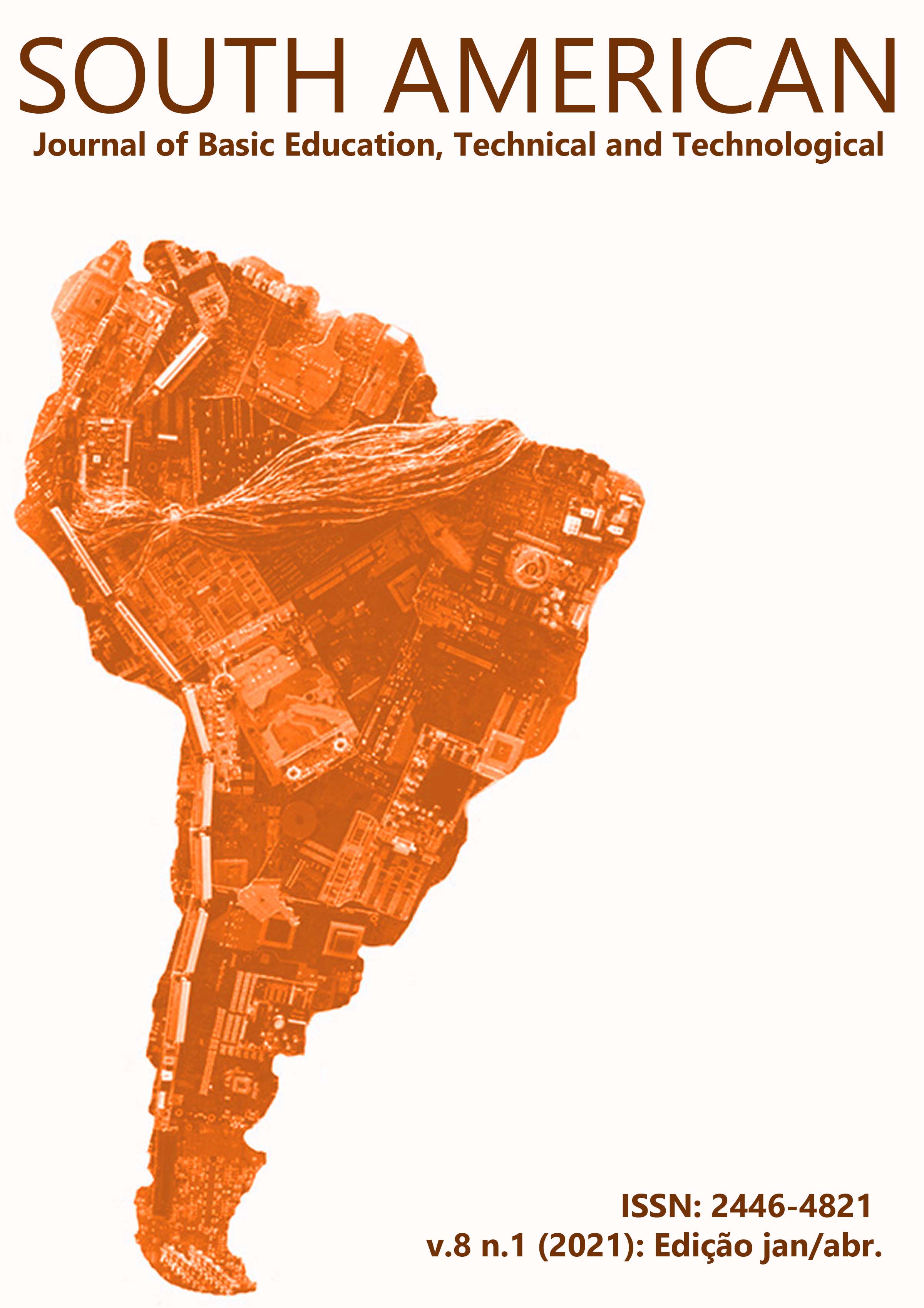EXPERIÊNCIAS INTERNACIONAIS COM A LESSON STUDY: EVIDÊNCIAS DE APRENDIZAGEM NA SALA DE AULA
Palavras-chave:
Lesson Study. Aprendizagem. Evidência de aprendizagem. Teoria de aprendizagem.Resumo
Este artigo resulta de um estudo, em curso em uma universidade no norte do Brasil, sobre teorias e evidências de aprendizagem em estudos centrados na metodologia internacionalmente conhecida como Lesson Study (LS). Orientada pela Revisão Sistemática, a pesquisa, de cunho exploratório, buscou identificar teorias e evidências de aprendizagem em artigos acadêmicos em inglês, publicados no período de 2016 a 2018, que apontassem a eficácia dessa metodologia no ensino de conteúdos na escola. Para tanto, foram revisados 793 artigos a partir de buscas realizadas no Google Scholar com cinco combinações de palavras-chave. Após dois processos de descarte de publicações com base em critérios previamente estabelecidos, foram identificados três artigos para análise final. Além da identificação de um número diminuto de artigos que atenderam aos critérios, a pesquisa confirma os argumentos de alguns autores de que muitos estudos sobre a LS se concentram no professor, deixando em segundo plano a investigação da aprendizagem do aluno, e de que são infrequentes discussões rigorosas sobre teorias de aprendizagem nesses estudos.
Downloads
Referências
[2] STIGLER, J. W.; HIEBERT, J. Understanding and improving classroom mathematics instruction. In: Australian Council for Educational Research. Raising Australian standards in mathematics and science: insights from TIMSS. Melbourne: ACER, p. 52-65, 1997. Disponível em: https://research.acer.edu.au/research_conference_1997/2/. Acesso em: 11 nov. 2020.
[3] STIGLER, H.; HIEBERT, J. The teaching gap: best ideas from the world’s teachers for improving education in the classroom. New York: The Free Press, 1999. Disponível em: https://www.researchgate.net/publication/44824783_The_teaching_gap_Best_ideas_from_the_world's_teachers_for_improving_education_in_the_classroom_New_York_NY_The_Free_Press. Acesso em: 11 nov. 2020.
[4] ELLIOTT, J. Significant themes in developing the theory and practice of lesson study. International Journal for Lesson and Learning Studies, v. 5, n. 4, p. 274-280, 2016. Disponível em: https://www.emeraldinsight.com/doi/full/10.1108/IJLLS-08-2016-0022. Acesso em: 11 nov. 2020.
[5] PANG, M. F.; MARTON, F. Beyond lesson study: comparing two ways of facilitating the grasp of some economic concepts. Instructional Science 31, p. 175-194, 2003. Disponível em: https://link.springer.com/content/pdf/10.1023%2FA%3A1023280619632.pdf. Acesso em: 11 nov. 2020.
[6] LARSSEN, D. L. S. et al. A literature review of lesson study in initial teacher education: perspectives about learning and observation. International Journal for Lesson and Learning Studies, v. 7, n. 1, p. 8-22, 2018. Disponível em: https://doi.org/10.1108/IJLLS-06-2017-0030. Acesso em: 11 nov. 2020.
[7] LO, M. The development of the learning study approach in classroom research in Hong Kong. Educational Research Journal, v. 24, n. 1, 2009. Disponível em: http://citeseerx.ist.psu.edu/viewdoc/download?doi=10.1.1.473.5329&rep=rep1&type=pdf. Acesso em: 11 nov. 2020.
[8] OLIVEIRA, K. L. S. J. Lesson study na formação inicial de professores: uma experiência com licenciandos de Letras-Inglês da Universidade Federal do Oeste do Pará. Santarém: UFOPA, 2018. Disponível em: http://www.ufopa.edu.br/ppge/images/dissertacoes/turma_2016/Ktia_Lais.pdf. Acesso em: 11. nov. 2020.
[9] OLIVEIRA, H. N. Lesson study: uma experiência com três professores de inglês da rede pública estadual em Santarém-PA. Santarém: UFOPA, 2018. Disponível em: https://sucupira.capes.gov.br/sucupira/public/consultas/coleta/trabalhoConclusao/viewTrabalhoConclusao.jsf?popup=true&id_trabalho=7061491. Acesso em: 11. nov. 2020.
[10] ISODA, M. et al (Ed). Japanese lesson study in mathematics: its impact, diversity and potential for educational improvement. Singapore: World Scientific, 2007.
[11] GILLIES, H. et al. Four teachers looking for a lesson: developing materials with lesson study. In: TOMLINSON, B.; MASUHARA, H. (Ed.). Research for materials development in language learning. London: Continuum, 2010, p. 237-250.
[12] LEWIS, C. Lesson study: the core of Japanese professional development. In: The Annual Meeting of the American Educational Research Association, 2000. Disponível em: https://eric.ed.gov/?id=ED444972. Acesso em: 11 nov. 2020.
[13] CHEUNG, W. M.; WONG, W. Y. Does lesson study work? A systematic review on the effects of lesson study and learning study on teachers and students. International Journal for Lesson and Learning Studies, v. 3, n.2, p.137-149, 2013. Disponível em: https://www.emeraldinsight.com/doi/full/10.1108/IJLLS-05-2013-0024. Acesso em: 11 nov. 2020.
[14] WOOD, P.; CAJKLER, W. A participatory approach to Lesson Study in higher education. International Journal for Lesson and Learning Studies, v. 5, n. 1, p. 4-18, 2016. Disponível em: https://doi.org/10.1108/IJLLS-08-2015-0027. Acesso em: 11 nov. 2020.
[15] RUNESSON, U. Pedagogical and learning theories and the improvement and development of lesson and learning studies. International Journal for Lesson and Learning Studies, v. 4, n. 3, p. 186-193, 2015. Disponível em: https://www.emeraldinsight.com/doi/full/10.1108/IJLLS-04-2015-0016. Acesso em: 11 nov. 2020.
[16] RUNESSON, U. Pedagogical and learning theories in lesson and learning studies – revisited. International Journal for Lesson and Learning Studies, v. 5, n. 4, p. 295-299, 2016. Disponível em: https://www.emeraldinsight.com/doi/full/10.1108/IJLLS-07-2016-0017. Acesso em: 11 nov. 2020.
[17] MARTON, Ference. Necessary conditions of learning. New York: Routledge, 2015.
[18] PETTICREW, M.; ROBERTS, H. Systematic reviews in the Social Sciences: a practical guide. Oxford: Blackwell Publishing, 2006.
[19] DARMAWAN, E. et al. SIMAS ERI learning model based on lesson study to increase student motivation and learning outcomes. International Journal of Research and Review, v. 4, n. 4, p. 40-47, 2017. Disponível em: https://www.researchgate.net/publication/317065815_SIMAS_ERI_Learning_Model_Based_on_Lesson_Study_to_Increase_Student_Motivation_and_Learning_Outcomes. Acesso em: 11 nov. 2020.
[20] LEONG, S. S. M. et al. Using lesson study to enhance meaningful understanding on the topic of pressure. International Journal of Environmental and Science Education, v. 11, n. 15, p. 8425-8437, 2016. Disponível em: https://eric.ed.gov/?id=EJ1118023. Acesso em: 11 nov. 2020.
[21] NOFRION, N. et al. Effectiveness of EXO OLO TASK learning model based on Lesson Study in Geography learning. IOP Conference Series - Earth and Environmental Science, 145, 2018. Disponível em: http://iopscience.iop.org/article/10.1088/1755-1315/145/1/012038/meta. Acesso em: 11 nov. 2020.
[22] VYGOTSKY, L. Thought and language. Edited and translated by Eugenia Hanfmann, Gertrude Vakar, and Alex Kozulin. Cambridge, Mass.: The MIT Press, 2012.
[23] PIAGET, J. The language and thought of the child. New York: Harcourt, Brace,
Jovanovich, 1926.
[24] ROCHELLE, J.; TEASLEY, S. D. The construction of shared knowledge in collaborative problem solving. In: O’MALLEY, C. (Ed.). Computer supported collaborative learning. Berlin: Springer, 1995, p. 69-97.
[25] FAWCETT, L. M.; GARTON, A. F. The effect of peer collection on children’s problem-solving ability. British Journal of Educational Psychology, v. 75, n. 2, p. 157-169, 2005. DOI: 10.1348/000709904X23411
Disponível em: http://content.ebscohost.com/ContentServer.asp?T=P&P=AN&K=17535469&S=R&D=aph&EbscoContent=dGJyMNXb4kSep684zOX0OLCmsEiep7RSsqy4SLeWxWXS&ContentCustomer=dGJyMOzpsEmzrLBJuePfgeyx44Dt6fIA. Acesso em: 11 nov. 2020.
Downloads
Publicado
Versões
- 2021-07-06 (2)
- 2021-06-29 (1)










